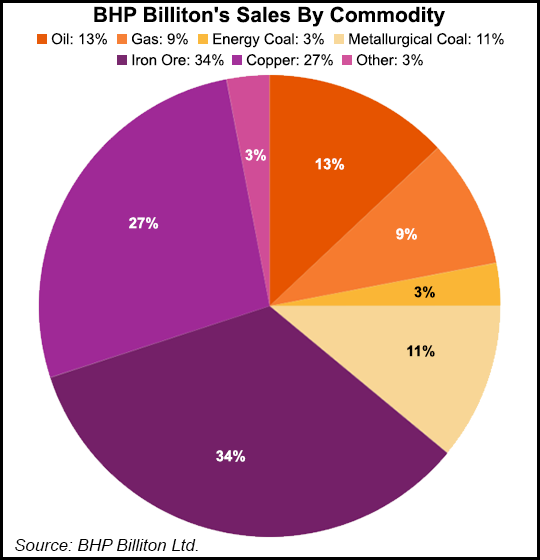Shale Daily | E&P | Eagle Ford Shale | Haynesville Shale | NGI All News Access | NGI The Weekly Gas Market Report | Permian Basin
BHP Ready to Wave Goodbye to U.S. Shale Portfolio
Australian mining conglomerate BHP Billiton Ltd., one of first foreign players to build a U.S. unconventional portfolio, within two years plans to completely divest the troubled business, which no longer is considered strategic.

Pressured by activist shareholders looking for better returns, the world’s largest mining operator also is seeking a buyer for its Australian Nickel West business. Management laid out the strategy earlier this month at the annual general meeting.
CEO Andrew Mackenzie told shareholders, “shale is noncore…We do consider we will see reasonable oil prices going forward, which is good for the businesses we retain and also the sales process.”
The announcement was not unexpected, as BHP in August said it planned to refocus its development solely on conventional oil and mining, while marketing its 800,000-plus acres in the U.S. onshore.
BHP, long an active player in the Gulf of Mexico, holds an estimated 838,000 net acres in the Permian Basin, and the Eagle Ford, Fayetteville and Haynesville shales.
In 2011 BHP agreed to buy Fayetteville Shale assets from Chesapeake Energy Corp. for $4.75 billion. It also paid $12.1 billion in 2011 to take over Petrohawk Energy Corp., at the time an Eagle Ford operator.
However, in part on volatile commodity prices, BHP has been forced to make massive one-time writedowns related to the U.S. onshore portfolio, which to date are estimated to be around $13 billion.
Activist shareholder and hedge fund operator Elliott Management long has pressed BHP to revert the focus to global mining only.
“We are just finding the right time in the market to offload,” Mackenzie told shareholders. “We really want to get this done in two years, ideally a bit less…”
Plans now are to provide a “comprehensive data room so that a wide range of people can come and look and kick the tires before they buy.”
While the GOM portfolio for now appears safe, the same cannot be said regarding the unconventional holdings.
Said Mackenzie, “At this stage, I see no way back.”
© 2024 Natural Gas Intelligence. All rights reserved.
ISSN © 2577-9877 | ISSN © 1532-1266 | ISSN © 2158-8023 |
